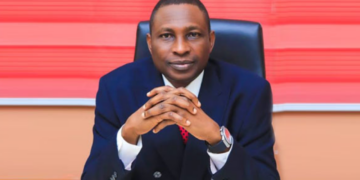Nigerians are beginning to lose count of the number of judgments by the Supreme Court regarding inter- and intra-party wranglings among political parties. Ideally, in a democracy, the rule of law is considered an integral part of the system. But up to a point, especially when the judicial process becomes more of an albatross stymieing the viability of the process that ought to enhance good governance.
The disturbing angle to these court judgments is that they are yet to assuage the crisis in some of the political parties. Worse is that the substance of the cases shows how low the nation’s politics has descended. And even tells a more agonising story of the character of the political operatives themselves.
It is sad, in our opinion, that the unmistakable selfish ambitions of the political class have exposed the judiciary to the intricacies of a decrepit political party system.
Perceptibly, in our view, the cases, across parties, boil down to an internal battle for the soul of the party. They are, largely, a fallout of the post-2023 election and a scheme to retain control ahead of 2027.
Interestingly, the crisis infestation has been only in the opposition parties, a situation that has led to a claim by top opposition leaders that the crises were instigated and sponsored by the ruling party, the All Progressives Congress (APC).
The argument is that it is part of a plan to pin the opposition down, keep them fighting, which leaves them weakened ahead of the next election cycle. The now famous punch-line by the opposition is that the ruling party is working towards a one-party state, devoid of any opposition.
This has been the easy and convenient explanation of the opposition leaders, who seem to seek the sympathy and understanding of the electorate for the failings within the ranks of the opposition parties. As much as we might not entirely dispute the claims of the opposition, we nonetheless believe that the crisis within their fold is largely self-inflicted. To be sure, the opposition has only itself to blame for the woes within its fold.
What we are witnessing in the crisis-ridden parties is a manifestation of a lack of party discipline and supremacy, disloyalty, financial recklessness, imposition of candidates, and disregard for party rules.
Since 1999, the party system has been largely about winning elections and power grab in a winner-takes-all way, such that those who lose out in internal party tussles are usually left in the cold or forced to leave the party. In other cases, those who lose in internal party tussles, driven by overambition, move to the next platform to pursue their quest for power.
Not even the ruling party is spared this malaise. We can argue that the reason the ruling party seems unhinged or less rumbustious is because it has an incumbent president whose overwhelming powers cannot be ignored by other party stakeholders.
Interestingly, parties, where their governors or elders are supposed to show direction, have not been able to live up to expectations, perhaps because of their inability to assert moral authority. However, the overriding concern about this murky political scenario is the impact it has had on the polity for decades.
The failure to have disciplined, vibrant, and ideology-based parties has seen a system where persons who have no business being in public office occupy sensitive policy-making positions. From the executive and legislature, both at the national and subnational levels, this has been the unfortunate reality. We have witnessed decades of reckless display of political power by persons entrusted with elected offices. We have seen persons continuously behave like political oligarchs, disregarding party rules and jumping ship when they feel their whims and caprices are about to be checked by a stronger political opponent.
In the face of these realities, the political parties, prostrate through compromises to the highest bidders, lack the guts to call erring members to order. This murky scenario has made it increasingly difficult for fairly disciplined individuals to join politics.
Unlike the now distant Second Republic, where political parties were supreme, we now see individuals’ interests overriding those of the party.
The place of ideology has been relegated to mere academic discussion in political parties. This key ingredient that attracts, glues, and defines individual interests into a refined collective whole for societal progress has become a luxury in governance and development. What seems to matter now is a raw power grab for selfish interest.
To be sure, the place of a vibrant and disciplined opposition in a democracy is non-negotiable. It is the bulwark upon which robust, competitive, representative democracy is built. It provides an institutionalised platform for robust debates in policy making, which drives any country. And in a multicultural and diverse country, the space for opposition expression is essential.
But it starts with a vibrant political party system, one that is disciplined and supreme. A system that does not bend to the wishes of the highest bidders or seek to serve the parochial interest of a few.
We urge the judiciary to be consistent in its judgment on matters of parties. It must insulate itself from the desperate machinations of the politicians who, driven by blind and ruthless ambition, would stop at nothing to get or consolidate power for selfish interests.
If there is any time the judiciary has to be firm and conscientious, it is now. It cannot afford to be swayed by the antics of a desperate few.




